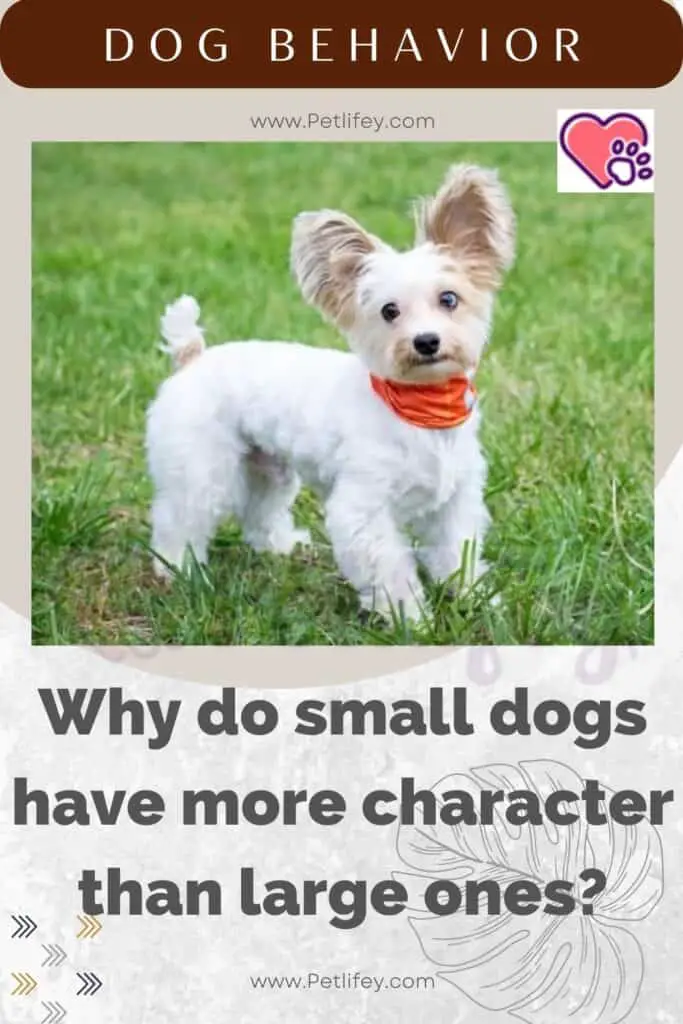
Since their appearance is not enough to impose fear on possible enemies, constant attention is their main defense system.
There are many reasons why small dogs have more character . Much of the problem relates to how owners educate and treat their pets. But, often, other elements also come into play that we will try to describe in the following article.
Today we will talk about why small dogs have more character than large ones.
Is it true that small dogs have more character?
First, we need to look at the location of small dogs. They are small in build and know they are, inevitably, at the bottom of the food chain. This is why we usually see breeds like Chihuahuas shaking or looking around, in constant alert.
Since their appearance is not enough to impose fear on possible enemies, constant attention is their main defense system. Precisely for this reason, for a need for survival, even the smallest dog shows aggression: it is a symptom of his fear.
Precisely this feeling allows the dog to be more attentive and even to react unexpectedly. An aggressive animal does this because it is in constant fear.
Of course, people smile at the aggression shown by small dogs, such as Chihuahuas, Dachshunds, Pekingese, Yorkshire or Pomeranian . But their goal is to communicate to the outside world that they will be ready for anything, just to defend themselves.
This is where the big dilemma begins as to whether small dogs have more character than large ones.
That said, it must be accepted that there is no evidence that one type of dog is more aggressive or dominant than another. It all depends on the personality of each individual specimen .
Why do small dogs have more character?
One of the main reasons a small dog is more dominant than large ones has to do with the way they are treated. Let’s take some examples:
- A Poodle may bark constantly, but no one takes it seriously. It is very likely that you will laugh and even ignore it, even if it does not stop.
- If a Great Dane barks, it immediately arouses fear. Its utterly intimidating size will prompt you to take steps to correct aggressive behavior.
Do you understand the problem? As long as you let the little dogs do what they want, given that you consider them “harmless” a priori, they will continue to be aggressive . On the contrary, a German Shepherd, a Dobermann and so on, will be immediately picked up and stopped by their master.
This gives the feeling that small dogs have more character than large ones. But is not so. In fact, the bosses indirectly allow them to develop this behavior, which turns them into little time bombs .
These behaviors are very destructive to our environment, especially if you have other pets. Correcting them will take a long time, but it is worth starting, perhaps taking advantage of appropriate therapies and the advice of a good dog trainer.
Another problem stems from excessive humanization . Due to their size, many people end up mistaking their little dog for some kind of toy and treat it as if it were their own child.
They dress him, take care of him and spoil him more than necessary. This also negatively affects their conduct.
They are always dogs

As deceptive as their size may be, even small dogs age as older dogs do . It is very common for an owner to continue to see their Chihuahua as a puppy when the reality is very different. In short, we end up treating an adult dog as if it were still a child.
This will only lead to serious consequences: constant barking, widespread disobedience and even dominant attitudes indoors. These are common symptoms of a condition called Small Dog Syndrome (PPS).
To avoid this, it’s best to give them a normal life, or rather, treat them like any other dog . The ideal would be to plan an exercise routine that reduces the animal’s energy to prevent it from developing these destructive behaviors.
In addition to this, it is recommended to strengthen obedience with breed-appropriate workouts.
You should avoid treating small dogs like puppies after a certain age, in order not to feed these unwanted behaviors.
If you lose control of the situation, you need to see your veterinarian or canine psychologist. Remember that each animal goes through different stages of life in a different way, which must be respected.






